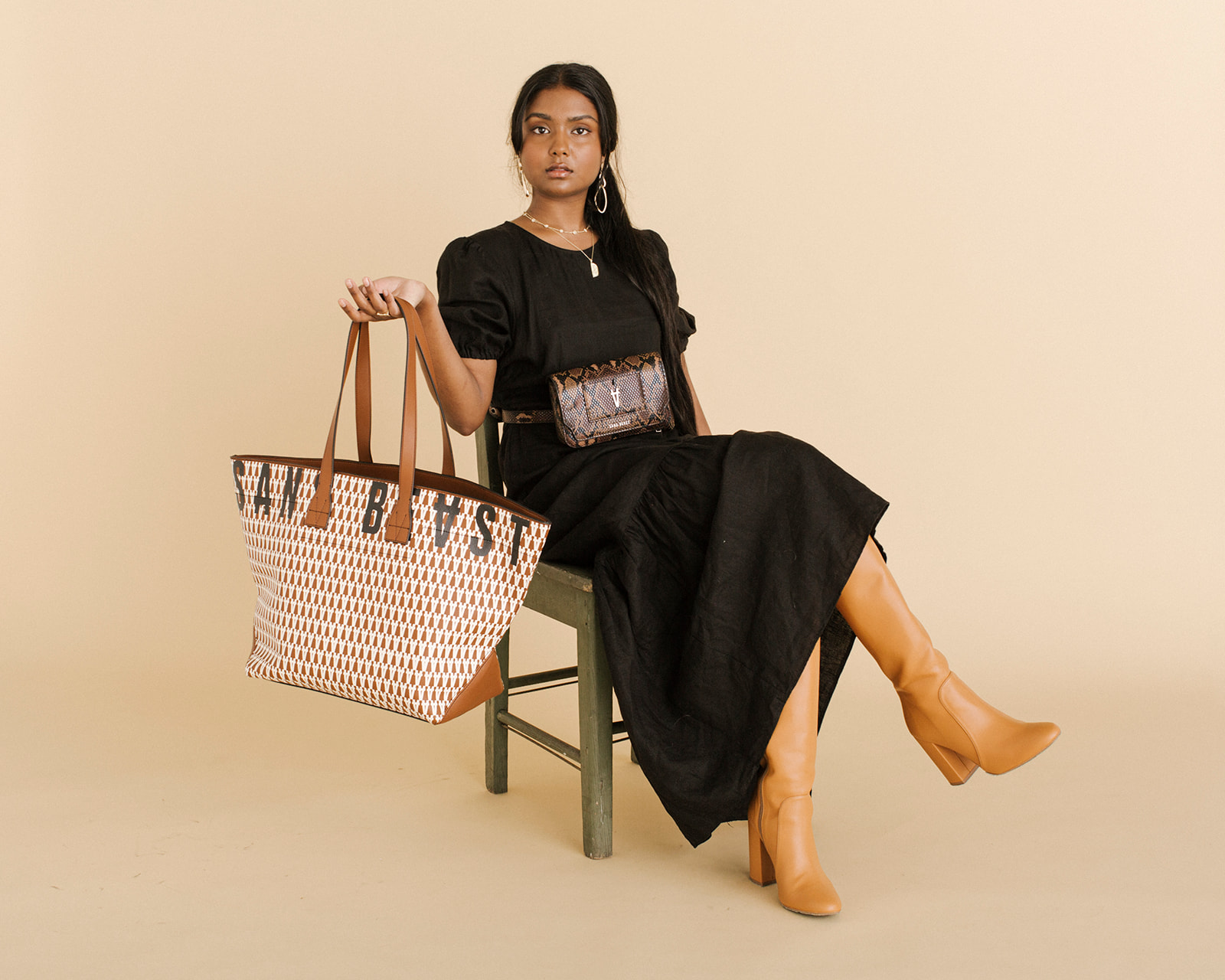
Wear it kind collection: Interviewing Collective Fashion Justice
This Autumn, in our Wear It Kind Collection, we interview and review some of fashions biggest animal welfare advocates and next gen materials promising to change the game for kinder fashion.
We recently met with Emma Hakansson, the Founding Director of Collective Fashion Justice, a charity that exists to create a total ethics fashion system that puts people, our fellow animals and the planet before profit.
We wanted to find out, in her own words, just why she took the bold step to start the collective and wave the flag for animal welfare in fashion.
So, Emma, what was it that got to where you are today?
I've worked in the fashion industry for a long time, first as a model and later as a creative consultant. Over time I became more aware of the true cost of fashion and how it was made. First, as a model, I didn't want to wear clothing made from animal-derived materials, or through environmental destruction and human harm. But I realised just how difficult it is to find brands aligned with these values. I chose to move into producing content for brands that were doing good things, and consult with others so they could improve, but ultimately, I didn't just want to help sell more stuff, I actually wanted to help transform the wider industry itself. I believe Collective Fashion Justice as a charity fills a gap, where a holistic approach to the fashion industry’s woes are collectively addressed.
You’re clearly a passionate animal welfare activist. What about the fashion industry today do you feel we critically need to change, in order to help animals?
As part of Collective Fashion Justice’s manifesto, we call to ultimately have a just transition that takes us beyond the use of animal-derived materials. Progress, innovation and cultural change must occur to make that possible.
I don’t believe the fashion industry can justify exploiting, killing and commodifying animals when we have the opportunity to make more responsible and just choices. There are things we can do in the interim to reduce suffering, but it's vital that those welfare improvements are not used to justify a wider system of continued exploitation. For example, if a brand using wool chooses to avoid sources practicing mulesing, that helps to mitigate some suffering, which is important. But, it's also critical that these same brands are also investing in "next generation" materials and committing to reduce and phase out their use of animal-derived materials, to move beyond viewing animals as commodities. This more effectively protects the lives of sheep, cuts back on methane emissions, and helps to protect the planet.
You've recently published a new book - Total Ethics Fashion. What was the drive behind writing this book?
Books are a space where people are given time to sit with things that may make them uncomfortable. In a fast-paced world of constant content consumption, we often don’t get that time or space to sit with ideas, consider them, and reflect on how our values align with new information.
In relation to animals in fashion specifically, I think that conversations are often tense because people actually do care about animals, and so considering that we may be contributing to a fashion industry that does not align with that care can be difficult. So this book is an opportunity for people to sit with information and consider an argument of, and to hopefully move through discomfort and into positive change. It invites people to choose their own value system and ask:
"This garment may look beautiful, but if I saw the entire process of production, would I still think it was beautiful, and something I wanted to buy?"
While we as consumers need to ask ourselves these questions, the fashion industry and the Government do too. These are also just made up of people, and we can all reflect on how we fit into the current fashion system, and how we’d like to see it change.
In the book, you talk about the need for greater investment in biomaterials and 'next generation' materials. How do you think we can achieve this?
Firstly, we need people to show that there is a demand for this innovation, and then we need the industry to feel willing to be bold and act. One of the wonderful things about the fashion industry is its creativity and exploration. We need to use those skills to move fashion towards a more ethical future.
While the industry moves, the Government must also be involved. We are seeing greater regulation all the time, for example through fur bans and guidance to prevent green-washing, but there’s an opportunity for economic transformation, too. Public funds are still used to subsidise cruel and destructive industries, which, for example, make leather and wool more affordable for brands to buy than those which are responsibly made. We need to move those subsidies into supporting industries that are good for us all.
Are there any 'next generation' materials have caught your attention?
There are two that are exciting me at the moment.
First, is MIRUM, made by Natural Fiber Welding. It's an animal and plastic free leather. They’ve just built a large manufacturing set up, which means they will be able to scale up their production to meet the growing demand of the fashion industry.
Another encouraging innovation, on a smaller scale, comes from Amazkin. Based out of the Peruvian Amazonian Rainforest, this project involves working through conservation agreements with Indigenous communities who harvest latex sap from shiringa trees, without harm to them. They produce animal and plastic free leather for the future, while continuing to defend their land from deforestation driven by cattle ranching. This is such a great example of a just transition that’s solving lots of different problems at once, for people, animals and the planet.
Tell us more about the Total Ethics Manifesto and how people can get involved.
The manifesto is essentially a north star for the fashion industry. We talk so much about responsible fashion, but in a vague way, and so we need specific things to work towards, if we want to make real progress.
First, the manifesto calls for de-growth in line with planetary guidelines. Without this, there is no future fashion industry. It also demands living wages for everyone across the supply chain, and finally, a just transition beyond materials sourced from animals, native deforestation and fossil fuels. Citizens, brands, governments and academics have signed on, and anyone can endorse it. The more voices we have, the more impact it can have on the fashion industry we are working to transform.
If you want to add your voice, click here: https://www.collectivefashionjustice.org/manifesto
In your words, what is your vision for a sustainable and ethical fashion future?
I want to see a fashion industry where the production of clothing is just as beautiful to look at as the garments themselves.
Right now, the fashion industry is so brutal that how it operates is often censored, for example, when footage from NGOs like FOUR PAWS highlight the horrific live plucking of geese for their feathers. We shouldn’t have a fashion industry that is difficult to look at, we should have one that is exciting to look at and feel a part of. If fashion put people, our fellow animals and the planet before profit, learning about how your clothes were made would make your appreciate them more. It would allow us to curate wardrobes that reflect our sense of style and our values alike, that are filled with memories not only from our wearing and re-wearing them, but from the creative, kind processes they were made through.


